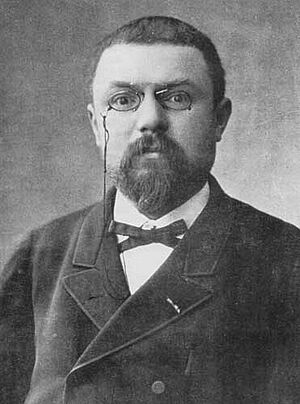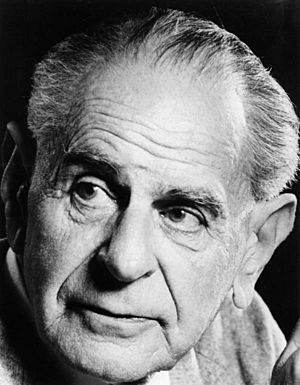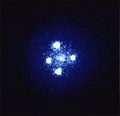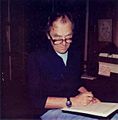Philosophy of science facts for kids

Philosophy of science is a part of philosophy that looks closely at science. It asks big questions about how science works. Philosophers who study science want to know how scientists gain knowledge. They also explore what makes science different from other ways of thinking or doing things. Modern science has helped us understand so much about the world. But how does it do this? To answer that, we need to explore several ideas.
Contents
What Makes Science Special?
Long ago, some people thought science was just organized common sense. Thomas Henry Huxley believed this. However, as the 20th century went on, science came up with many ideas that were not like common sense at all. This showed that science was indeed something special. But what exactly was it? This question is called the demarcation problem.
The demarcation problem is about telling the difference between real science and non-science. This includes things like pseudoscience, which pretends to be science. Karl Popper called this the most important question in the philosophy of science. Not everyone agrees on the answer. Some philosophers even think it's too hard to solve.
How Scientists Test Ideas
Some early thinkers, called logical positivists, believed science was based only on what we can observe. They thought something was true if it could be proven by seeing it. If it couldn't be observed, they thought it was meaningless.
But Karl Popper had a different idea. He said that the main feature of science is falsifiability. This means that any scientific idea must be able to be proven wrong. If you try hard to prove an idea wrong and can't, then it's likely true. Many scientists, like Peter Medawar, liked Popper's ideas.
However, some people noticed a problem. Scientists often didn't throw away their theories even when a prediction was wrong. Instead, they would just change the theory a little bit. This showed that while falsifiability is important, it's not a simple way to tell science from non-science.
Other ideas were tried. One idea was that science is about solving problems and finding answers. But many other fields do that too. Another idea was that science searches for objective truth. But objective is hard to define. It's also hard to say if science is truly objective.
In fields like biology, there were many observations. Charles Darwin helped make sense of them by showing how evolution could explain what was seen. In sciences like biology, geology, or astronomy, a big part of the job is to explain what has happened and what we see. So, explanations, observations, and theories are all part of the philosophy of science.
Theories and Observations in Science
Both theories and observations are key parts of science. They work together in a cycle. A great example is when Albert Einstein predicted that a strong source of gravity, like a star, would bend light passing nearby.
In 1919, a team went on an expedition to observe stars near the Sun during a solar eclipse. They saw that the stars' positions looked a little different than usual. This meant the Sun's gravity was pulling the light towards it. This observation confirmed Einstein's prediction from his general theory of relativity, published in 1915. It was the first strong proof for Einstein's theory.
This example shows how observation and theory are connected. The observation was made because of the theory. Then, the observation strongly supported the theory. The theory passed a very important test. Since then, many more tests have been done on Einstein's ideas, and they all fit his theory.
A Simple Idea of Science
Some people used to think that science starts with observations. They believed all scientific knowledge came from facts we experience. Then, theories were made from these facts and tested by making predictions.
Here's how some philosophers thought about this simple idea of science:
---> INDUCTION ---> LAWS AND THEORIES ---> DEDUCTION ---> | | | | | PREDICTIONS AND EXPLANATIONS FACTS OF EXPERIENCE
Most philosophers today don't believe this simple idea. It suggests science is a one-way street from facts to theories. But the Einstein example shows that theories can also lead to new observations. The real relationship between different parts of science is much more complex.
Testing Scientific Predictions
Philosophers Pierre Duhem and W.V. Quine said it's impossible to test a theory all by itself. For example, to test Newton's Law of Gravitation in our solar system, you need to know the masses and positions of the Sun and all the planets.
A famous example happened in the 19th century. Scientists couldn't predict the orbit of Uranus using Newton's Law. But they didn't throw out Newton's Law. Instead, they thought maybe there were more than seven planets. This led to the discovery of an eighth planet, Neptune. If a test fails, something is wrong. But it's hard to know what it is: a missing planet, bad equipment, or something else.
This idea means that any theory can be made to fit observations by adding new ideas. This is why science uses Occam's razor. This rule says that we should choose the simplest explanation. It helps get rid of ideas that don't have good reasons.
This led Karl Popper to say that a scientific idea must make testable predictions. If an idea doesn't make predictions that can be tested, it's not science. It might be useful, but it's not scientific. W.V. Quine thought that observations alone are not enough to choose between theories. He believed a theory can always be made to fit the observations. However, scientists often use guiding rules like Occam's Razor to help them decide which theory is best.
Because of these ideas, philosophers of science say that observations used in science must be intersubjective. This means that different people should be able to agree on what they are observing. It's easy to agree on observations of physical things. It's harder to agree on social or mental things. It's very difficult to agree on things like theology or ethics. That's why these topics are usually not part of science.
Other Important Ideas
Are There Scientific Methods?
Is there just one scientific method? Paul Feyerabend argued that no single description could cover all the ways scientists work. He felt that trying to force scientists to follow one method would stop new discoveries. Feyerabend famously said, "the only principle that does not inhibit progress is: anything goes."
Big Changes in Science
Thomas Kuhn said that you can't separate a hypothesis from the theory it comes from. He believed that observations always depend on a specific paradigm. A paradigm is like a complete "picture" of the world. It has no contradictions and fits with observations made from that viewpoint.
Kuhn thought that different paradigms could both explain the world well. But there's no common way to compare them directly. Instead, people decide which "picture" seems most useful for solving scientific problems.
For Kuhn, choosing a paradigm wasn't just about logic. He believed it was also a social process, where scientists in a community agree on a new way of thinking. Kuhn said that a paradigm shift happens when the old way of thinking has too many problems. The new paradigm is chosen because it does a better job of solving scientific problems than the old one.
Even though observations are connected to theories, they are still very important in science. Scientific understanding comes from observations. But accepting scientific ideas also depends on the theory they are part of. Of course, more testing can help solve disagreements.
Related pages
- Empiricism
- Epistemology
- Falsifiability
- Materialism
- Naturalism (philosophy)
- Paradigm
- Positivism
- Logical positivism
- Rationalism
- Scientific method
- Scepticism
- Causality
- Probability
- Inductive reasoning
Images for kids
-
Seen through a telescope, the Einstein cross seems to provide evidence for five different objects, but this observation is theory-laden. If we assume the theory of general relativity, the image only provides evidence for two objects.
-
Francis Bacon's statue at Gray's Inn, South Square, London
-
Jeremiah Horrocks makes the first observation of the transit of Venus in 1639, as imagined by the artist W. R. Lavender in 1903
-
Peter Godfrey-Smith was awarded the Lakatos Award for his 2009 book Darwinian Populations and Natural Selection, which discusses the philosophical foundations of the theory of evolution.
-
A fragment of the Hippocratic Oath from the third century.
-
Wilhelm Wundt (seated) with colleagues in his psychological laboratory, the first of its kind.
See also
 In Spanish: Filosofía de la ciencia para niños
In Spanish: Filosofía de la ciencia para niños
 | John T. Biggers |
 | Thomas Blackshear |
 | Mark Bradford |
 | Beverly Buchanan |












